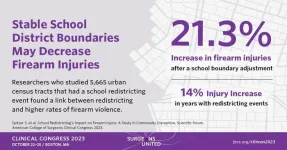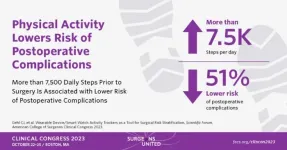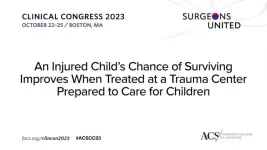(Press-News.org) Women faculty are more likely to leave academia than men faculty throughout all career stages in U.S. universities, University of Colorado Boulder researchers revealed in the most comprehensive analysis of retention in academia to date.
The team published the findings Oct. 20 in the journal “Science Advances.” The researchers found that a harsh workplace climate, which can include harassment and feelings of not belonging, was the most common reason women left academia. This attrition affects not only early-career professionals, but also those who have achieved the highest ranks in universities, the study found.
This finding helps to explain, in part, why women remain underrepresented among faculty in nearly all academic fields in the U.S., said Katie Spoon, the paper’s first author and a PhD student in the Department of Computer Science. For example, only 28% of professors in science, technology, engineering and math (STEM) fields are women in the U.S., despite women receiving 40% of STEM PhDs for the past 10 to 15 years.
“If you look back at the literature from 20 or 30 years ago, it painted a much bleaker picture than many of the newer studies today,” said Aaron Clauset, the paper’s corresponding author and a professor of computer science. “Things are changing, but there is still a lot of work left to do.”
Previous research on gendered attrition in academia tended to have a limited scope.
Many studies investigated faculty retention only among assistant professors, in STEM fields, or at high-prestige institutions, due to the difficulties in finding and reaching faculty who left academia.
Spoon and her team analyzed a census of employment records of all 245,270 tenure-track and tenured professors from 391 PhD-granting universities and institutions in the U.S. They came from STEM fields, but also disciplines like social sciences and business. The tenure track is a professor's pathway to promotion. Faculty members usually start as assistant professors without tenure. If they get promoted, they become tenured associate professors, and eventually they can be promoted to full professors, an indefinite appointment that tends to come with more academic freedom and job security.
The researchers found women are leaving academia at a higher rate than men at every career stage, especially after they receive full professorship. During their appointment as assistant professors, women are 6% more likely to leave their jobs than men each year. The attrition rate is higher among full professors, where women professors are 19% more likely to leave academia than men each year.
“We were surprised to see the gender gap actually grow after faculty received tenure, given how important the title is,” Spoon said. “This result suggests that perhaps the field has neglected thinking about tenured women and their experiences.”
The team also surveyed more than 10,000 current and former faculty members for factors that led or could lead to their decision to leave a faculty job. The result showed women are more likely to feel pushed by a variety of factors out of their faculty positions, while men are more likely to be pulled toward more attractive jobs elsewhere. The most common reasons women, especially tenured women, reported for leaving academia were harsh workplace climates, which can include dysfunctional leadership, harassment, discrimination and feelings of not belonging.
While previous research has suggested that women are more likely to leave academia in pursuit of better work-life balance, the new paper found that male faculty were about as likely to leave for this reason.
“We see an emphasis on work-life balance among early career faculty members,” said Clauset. “But the issue with workplace climate is the dominating factor among the women tenured professors, a position that lasts the majority of one’s academic career.”
The researchers hope their paper will inspire administrators nationwide to take action.
“It can start with asking faculty, particularly women, what needs to be done, listening, and taking specific, concrete steps to address their concerns,” Spoon said.
END
Harsh workplace climate is pushing women out of academia
2023-10-20
ELSE PRESS RELEASES FROM THIS DATE:
Dingoes given ‘almost-human’ status in pre-colonial Australia
2023-10-20
It's said that a dog is a man’s best friend, but the wild dingo is much maligned in Australia. This may not always have been the case though, with new research led by experts at The Australian National University and The University of Western Australia suggesting that dingoes were buried – and even domesticated – by First Nations people prior to European colonisation.
The researchers examined remains at the Curracurrang archaeological site, south of Sydney, where radiocarbon dating of dingo bones revealed the animals were buried alongside humans as far back as 2,000 years ago.
The care taken to bury the animals ...
Soft, living materials made with algae glow under stress
2023-10-20
A team of researchers led by the University of California San Diego has developed soft yet durable materials that glow in response to mechanical stress, such as compression, stretching or twisting. The materials derive their luminescence from single-celled algae known as dinoflagellates.
The work, inspired by the bioluminescent waves observed during red tide events at San Diego’s beaches, was published Oct. 20 in Science Advances.
“An exciting feature of these materials is their inherent simplicity—they need no electronics, no external ...
Army of specialized T cells may trigger asthma attacks in older men
2023-10-20
LA JOLLA, CA—Scientists from La Jolla Institute for Immunology (LJI) and The University of Southampton, UK, have uncovered a group of immune cells that may drive severe asthma. These cells, called cytotoxic CD4+ tissue-resident memory T cells, gather in the lungs and appear to possess the molecular weaponry to cause the most harm in men who developed asthma later in life.
"If you are male and you develop asthma after age 40, there's a high chance this T cell population is in your lungs," says LJI Research Assistant Professor Gregory Seumois, Ph.D., who co-led the study with LJI Professor Pandurangan ...
A cancer survival calculator is being developed using artificial intelligence
2023-10-20
Key Takeaways
A cancer survival calculator prototype developed with machine learning showed that for each of three cancer types tested, more factors than cancer stage significantly influenced patients’ survival.
Preliminary research on the calculator found high accuracy of this individualized survival estimator.
BOSTON (October 20, 2023): Researchers have developed an artificial intelligence (AI)–based tool for estimating a newly diagnosed cancer patient’s chances for surviving long term, according ...
Study links school redistricting to higher rates of firearm violence in urban communities
2023-10-20
Key takeaways
This is the first study to examine the impact of school redistricting on firearm violence in urban communities, examining data from 63,000 urban census tracts.
Any school redistricting event was associated with a 10.6% higher firearm incidence rate compared with communities that had no redistricting, and school boundary adjustments were associated with a 21.3% increase.
In areas that had a school redistricting event, firearm violence increased 14% in the year the redistricting occurred over the previous year.
BOSTON (October 20, ...
East Los Angeles program to remove tattoos may help reduce traumatic injuries
2023-10-20
Key Takeaways
Tattoos, especially those related to gangs and sex work, can make individuals targets for violence.
Tattoos may also make it more difficult for individuals to make changes in their lives, including finding a job or joining the military.
Nearly nine out of 10 of the program’s clients (88%) desired tattoo removal to transition to a healthier life, and more than eight of 10 clients (81%) reported success in achieving their goals after tattoo removal.
BOSTON (October 20, 2023): Tattoo removal may help to reduce violence and trauma in East Los Angeles, according to study results being presented at the American ...
More than 7,500 daily steps prior to surgery is associated with lower risk of postoperative complications
2023-10-20
Key takeaways
Using Fitbit activity tracking data, researchers identified patients who might be at higher risk of postoperative complications. Fewer daily steps were associated with a higher rate of complications postoperatively.
The odds of complications within 90 days after hospital discharge were reduced by half if a patient took more than 7,500 steps a day before the operation, after adjusting for the complexity of the procedure, comorbidities, and other factors.
CHICAGO (October 20, 2023): Patients who recorded more ...
Pediatric trauma more common during COVID-19 pandemic, especially for children in disadvantaged neighborhoods
2023-10-20
Key Takeaways
Childhood trauma rates increased during the COVID-19 pandemic and were disproportionately higher for children in socioeconomically deprived areas.
In this vulnerable population, injuries were most often due to motor vehicle crashes, firearms, and non-accidental trauma.
The study adds to growing evidence of pandemic-related effects on health and reinforces the need for efforts to prevent pediatric trauma.
BOSTON (October 20, 2023): Injuries from gunshots and motor vehicle ...
An injured child’s chance of surviving improves when treated at a trauma center prepared to care for children
2023-10-20
Key Takeaways
Trauma centers with the highest pediatric readiness scores (93 or greater) on a national assessment have much lower death rates than centers scoring lower.
All trauma centers should address gaps in pediatric emergency care — most importantly, the lack of having a pediatric-specific quality improvement plan.
BOSTON (October 20, 2023): Children initially treated at trauma centers with the highest level of preparedness to care for children, called pediatric readiness, are significantly less likely to die than those initially treated at trauma facilities with lower pediatric readiness levels, new research shows. The findings are being presented ...
Reliable patient education materials on breast cancer are difficult to access
2023-10-20
Key Takeaways
Women with breast cancer, who are making complex decisions about treatment options during an already stressful time, may turn to the wide variety of materials available online, which are not always from data-driven sources.
Researchers found that educational materials often vary in quality, can have a negative tone, and are written above the sixth-grade reading level recommended by the National Institutes of Health.
BOSTON (October 20, 2023): Women with breast cancer must often make complex decisions about surgery and treatment options ...






